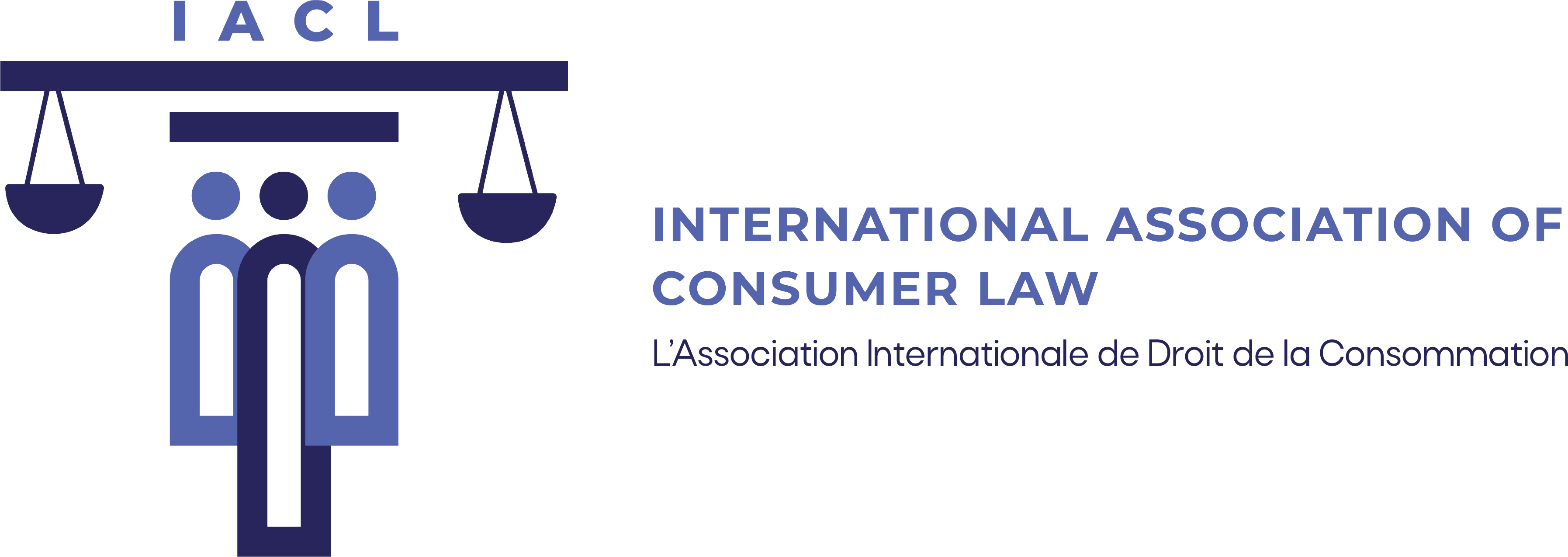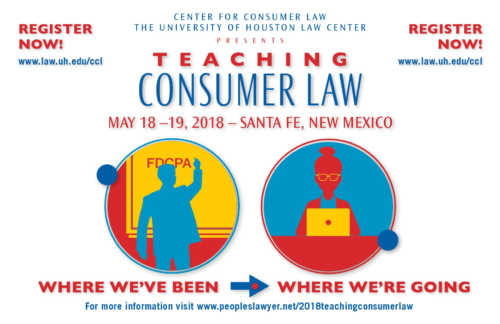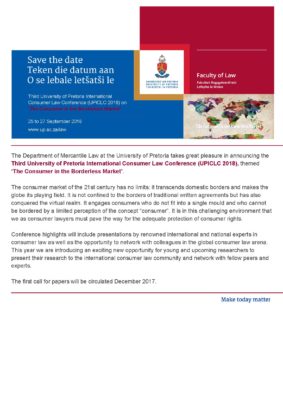CONCLUSIONES Y RECOMENDACIONES.
XVII CONGRESO ARGENTINO DE DERECHO DEL CONSUMIDOR
I ENCUENTRO NACIONAL DE PROFESORES DE DERECHO DEL CONSUMIDOR
En memoria al Profesor Dr. Félix A. Trigo Represas
Mar del Plata, 3 y 4 de noviembre de 2017
COMISIÓN Nº 1 Prácticas y cláusulas abusivas
Presidentes: Dres. Sandra Frustagli y Sebastián Barocelli
Coordinador: Dr. Andrés Varizat
Secretarios: Dras. María Mumare y María Paula Arias
Consideraciones comunes a ambos institutos:
- Los institutos de prácticas y cláusulas abusivas continuan la tradición jurídica del derecho privado en cuanto tienen como antecedente la prohibición de ejercer abusivamente los derechos.
- Entre las prácticas y las cláusulas abusivas existe una relación de género-especie, por ende las disposiciones referidas a las primeras resultan aplicables supletoriamente a las claúsulas abusivas.
Prácticas abusivas
- Las prácticas comerciales consisten en conductas desplegadas en el mercado por los proveedores de bienes y servicios, en el marco de las relaciones de consumo.
- El estándar de apreciación de la ilicitud de las prácticas abusivas debe contemplar la situaciones de hipervulnerabilidad de los consumidores.
- Las prácticas comerciales se tornan ilícitas cuando vulneran los derechos de los consumidores y usuarios, reconocidos en la Constitución Nacional y los tratados internacionales de derechos humanos.
- Constituye un supuesto de prácticas abusivas el trato discriminatorio. En ese sentido, resulta recomendable visibilizar como supuestos de trato de discriminatorio las diferencias de precios basadas en cuestiones de género.
- Constituye también un supuesto de práctica abusiva la publicidad que induce a conductas perjudiciales para el ambiente o consumos insustentables.
- Resulta recomendable que las autoridades públicas, nacionales o locales, en sus ámbitos de competencia, elaboren listados o enumeraciones no taxativas de prácticas comerciales abusivas para garantizar la efectividad de su prevención, control y sanción.
- Frente a prácticas comerciales ilícitas los consumidores podrán invocar la ineficacia del acto, si procediere, además de disponer de remedios de naturaleza preventiva, resarcitoria y sancionatoria.
Cláusulas abusivas:
- Se reafirma que la noción de cláusula abusiva se construye a partir de la idea de desequilibrio en el diseño normativo de los derechos y obligaciones de las partes en perjuicio del consumidor, independientemente de su negociación o no, provocando su ineficacia absoluta.
- Se reafirman las ventajas de los sistemas que centran la desestimación de las cláusulas abusivas a partir de estándares abiertos y generales, sin perjuicio de la tipificación de supuestos específicos de cláusulas que se reiteran en el mercado.
- En la articulación entre los sistemas de control administrativo y judicial en materia de cláusulas abusivas resulta indispensable reconocer a los fines de la eficacia de la tutela que la aprobación administrativa de las condiciones generales de la contratación no excluye el control judicial de las cláusulas abusivas.
- Constituyen supuestos de cláusulas abusivas que deberían prohibirse expresamente: a) la cláusula de “caducidad de plazos” por incumplimiento en las operaciones de crédito al consumo; y b) a cláusula que faculta al proveedor a modificar unilateralmente las condiciones del contrato.
Recomendaciones finales:
- Se recomienda que la autoridad de aplicación de los sistemas de ahorro previo para fines determinados adopte medidas eficaces para garantizar la transparencia y combatir las prácticas y cláusulas abusivas que se reiteran en ese sector de la contratación con consumidores.
- Se pone de relieve la importancia de instan acciones colectivas a los fines de combatir eficazmente las prácticas y cláusulas abusivas.
Comisión N° 2 Medios alternativos y protección procesal del consumidor
Presidentes: Dres. Fernando Mumare y Alejandro Vega
Coordinador: Dr. Gonzalo Rodriguez
Secretarios: Dres. Federico Martínez Bordaisco y Lorena Bianchi
Ponentes: Esteban Carbonell O’Brien; César Carranza Álvarez; Maryuri Hortencia Suarez Tapia; Samanta Roxana Lagrutta; Cristian Rubén Luisi; Diego Andres Salvucci; Estela Alejandra Castillo Lo Bello; María Paula Arias; Gonzalo Rodriguez.
- Derecho a la educación del consumidor
Es necesario promover la incorporación de la asignatura derecho del consumidor en la educación media y universitaria. Instar a los gobiernos que adopten políticas públicas de concientización de los derechos de los consumidores.
- Autoridades de Aplicación
Se recomienda, tanto a nivel nacional como provincial, que el organismo administrativo específico para la defensa de los derechos de los consumidores, se le confiera independencia de los tres poderes estatales, dotándolo de alta jerarquía y autarquía financiera.
- Consumidores hipervulnerables
La hipervulnerabilidad del consumidor exige intensificar las garantías procesales contenidas en el sistema de protección de consumidores y usuarios.
- Daño directo
Se recomienda la adecuación de la normativa de las provincias al actual artículo 40 bis de la Ley 24.240 modificada por Ley 26.994.
- Función disuasoria de las sanciones administrativas
Es necesario considerar como un criterio de cuantificación de las sanciones administrativas su función disuasiva, teniéndose en cuenta la envergadura económica y comercial del proveedor.
- Protección del usuario de servicios financieros.
Se recomienda que los entes de contralor del sistema financiero cuenten con vías accesibles, gratuitas y eficaces de resolución de conflictos.
- Protección de los consumidores de crédito contra acciones de recupero abusivas:
- la vía reconocida por el artículo 39 de la Ley de prenda N° 12.962 resulta desplazada por colisionar con los principios fundamentales del derecho del consumo, por lo que no corresponde su planteo contra los consumidores de crédito.
- Resulta deseable una modificación legislativa que determine la prohibición expresa de los eventuales planteos de los secuestros prendarios contra los consumidores de crédito.
- Competencia en materia de consumo
A través de una interpretación sistémica y dialógica del ordenamiento normativo de protección del consumidor (arts. 3 y 36 de la Ley 24.240, arts. 1109, 1651 inc. c. y 2654 del CCCN, art. 5 de la Ley 26.993) la competencia en materia de consumo, se determina:
- Para el caso que el consumidor o usuario sea legitimado activo, a opción de este por: el lugar de consumo o uso; el de celebración del contrato; el domicilio del proveedor o prestador o citado en garantía; o el domicilio real del consumidor o usuario.
- Para el caso que el consumidor o usuario resulte legitimado pasivo la pauta de competencia está dada por su domicilio real.
- Mediación prejudicial obligatoria
En los ordenamientos jurídicos provinciales que exigen la mediación prejudicial obligatoria, no resultaría necesario recurrir a la misma si ya se concurrió al procedimiento administrativo de conciliación, ya que ambos métodos alternativos de solución de conflictos satisfacen el mismo objetivo cual es el de promover y desarrollar métodos no adversariales y desjudicializados de resolución de conflictos.
- Justicia gratuita
El beneficio de justicia gratuita del consumidor o usuario tanto para el ejercicio de acciones individuales como colectivas (art. 53 y 55 de la Ley 24.240) constituye una derivación del derecho fundamental a obtener procedimientos eficaces para la prevención y solución de conflictos (art. 42 C.N.). En otras palabras, dicho beneficio legal constituye una herramienta de implementación de derechos fundamentales.
Comisión N° 3: Precaución, prevención y punición de daños al consumidor
Presidentes: Dr. Gonzalo Sozzo y Dr. Rodrigo Cataldo
Coordinador: Dr. Rodolfo González Zavala
Secretarios: Dras. Verónica Tambascia y Julieta Trivisonno
Aspectos generales
1) El CCC al reestructurar la responsabilidad civil incorpora soluciones que, a través del diálogo de fuentes, enriquecen la tutela preventiva, resarcitoria y punitiva del consumidor.
Sanción pecuniaria disuasiva
2) La sanción pecuniaria disuasiva tiene una función de prevención y de punición, de acuerdo a las circunstancias del caso.
3) El grave menosprecio o el desmantelamiento del ilícito lucrativo constituyen alternativamente requisitos de procedencia de la sanción pecuniaria disuasiva, según que la función sea punición o prevención.
4) Se debatió la cuestión del destino que debe darse a la sanción. Por un lado, se sostuvo que el destino de la sanción debería ser mixto, dirigido en parte al consumidor y en parte a fondos especiales, sobre todo cuando se trate de daños a derechos de incidencia colectiva. Por otro lado, se sostuvo que la solución del art. 52bis incentiva a que el consumidor demande la sanción pecuniaria disuasiva.
Principio precautorio
5) El principio precautorio, a través del diálogo de fuentes, puede aplicarse a casos del Derecho del Consumidor si se dan sus presupuestos de procedencia (de lege lata).
6) En una futura reforma el principio precautorio debe incorporarse al Derecho del Consumidor (de lege ferenda).
Prevención
7) El art. 1710 inc. b del CCC complementa la obligación de seguridad hacia el consumidor.
8) En el marco del art. 1710 inc. B del CCC el incumplimiento del deber de prevención puede generar la obligación de resarcir daños al consumidor.
9) Las cargas probatorias dinámicas resultan aplicables a casos de prevención de daños a consumidores.
10) En los contratos de consumo que involucran derechos humanos la prevención del daño resulta prioritaria sobre la base del principio de dignidad del consumidor.





